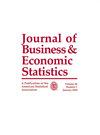经济增长与碳排放的关系:巴西旅游业的功能
IF 2.9
2区 数学
Q1 ECONOMICS
引用次数: 5
摘要
国际旅游业对新兴市场的影响是非常有利的。尽管旅游业带来了明显的好处,但它以污染的形式为环境付出了高昂的代价。巴西每年涌入的游客有可能促进经济发展,破坏该国的生态系统。本调查的目的是利用1990年至2019年的时间序列数据分析巴西旅游业和经济增长(GDP)对二氧化碳(CO2)排放的影响。采用单位根检验检验数据的平稳性,并采用自回归分布滞后(ARDL)技术来调查因素之间的联系,同时考虑到长期和短期。本研究表明,巴西旅游业、GDP和二氧化碳排放量之间存在长期和短期的联系。然而,旅游业和经济扩张都对巴西的生态造成了严重的负面影响。这些结果表明,为了保持巴西的环境质量,政策制定者需要追求更环保的经济扩张以及环保意识的旅游法规。本文章由计算机程序翻译,如有差异,请以英文原文为准。
Economic Growth and Carbon Emission Nexus: the Function of Tourism in Brazil
The impact of international tourism on emerging markets has been overwhelmingly beneficial. Despite the obvious benefits of tourism, it comes at a high price for the environment in the form of pollution. Brazil's annual tourist influx has the potential to boost economic development and damage the country's ecosystems. The objective of this investigation is to analyze, using time series data ranging from 1990 to 2019, the effects of tourism and economic growth (GDP) on carbon dioxide (CO2) emissions in Brazil. The stationarity of the data was examined by employing unit root tests, and an autoregressive distributed lag (ARDL) technique was used to investigate the link between the factors, taking both the long- and the short-run into consideration. This research shows that there are long-term and short-term ties between Brazil's tourism industry, GDP, and CO2 emissions. Yet, both tourism and economic expansion have had serious negative effects on Brazil's ecology. These results indicate that in order to maintain environmental quality in Brazil, policymakers need to pursue more eco-friendly economic expansion as well as environmentally conscious tourist regulations.
求助全文
通过发布文献求助,成功后即可免费获取论文全文。
去求助
来源期刊

Journal of Business & Economic Statistics
数学-统计学与概率论
CiteScore
5.00
自引率
6.70%
发文量
98
审稿时长
>12 weeks
期刊介绍:
The Journal of Business and Economic Statistics (JBES) publishes a range of articles, primarily applied statistical analyses of microeconomic, macroeconomic, forecasting, business, and finance related topics. More general papers in statistics, econometrics, computation, simulation, or graphics are also appropriate if they are immediately applicable to the journal''s general topics of interest. Articles published in JBES contain significant results, high-quality methodological content, excellent exposition, and usually include a substantive empirical application.
 求助内容:
求助内容: 应助结果提醒方式:
应助结果提醒方式:


